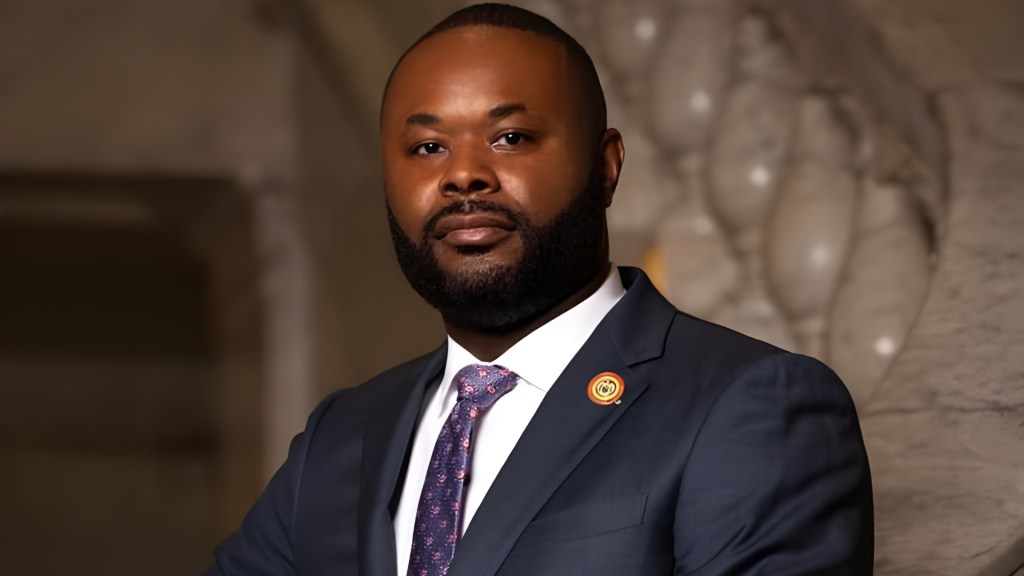By Senator Cory V. McCray
In recent years, Maryland’s landscape has undergone a profound transformation with the rapid proliferation of cannabis dispensaries and smoke shops. Today, more than 100 licensed establishments operate across the state, and with a new wave of licenses recently approved, this number is set to rise. As our government continues to pave the way for more cannabis businesses, we stand on the threshold of an even greater influx into our communities.

photo: Courtesy photo
Just a year ago, my colleagues and I, in Annapolis, cast our votes in favor of the Cannabis Reform Act with the best of intentions. This legislation, which legalized recreational marijuana in Maryland, allowed individuals 21 and older to possess, use, or grow a small amount of cannabis. We viewed the legalization of recreational marijuana as a bold, progressive step forward—a necessary correction to the inequities of past policies that disproportionately targeted Black communities. I have witnessed firsthand the devastating impact of these penalties on families and neighborhoods, which is why I felt a deep sense of gratitude when the Moore-Miller Administration pardoned 175,000 cannabis possession convictions in Md. It was a powerful moment of redemption, a step toward righting historical wrongs.
Yet, as we debated the legalization of recreational cannabis, I found myself grappling with concerns about the potential emergence of problematic businesses. Under the medical cannabis framework, each legislative district was restricted to just two dispensaries. In my district, while one dispensary upheld the standards of the neighborhood, the other became a source of constant concern, generating a flood of emails and phone calls to my office. Despite my efforts to raise these issues during the hearings, it was disheartening to see that some lobbyists and a number of my colleagues who pushed the bill, did not view this as a priority.
In Cedmont, a community in the 45th Legislative District that I represent, the transformation is unmistakable. What was once a tranquil neighborhood—where children played freely and neighbors exchanged greetings during leisurely walks—now contends with long lines of unfamiliar faces stretching around the nearby cannabis dispensary. When I sought clarity from the oversight agency, the Maryland Cannabis Administration, they candidly admitted that they lacked the necessary tools to address the neighborhood concerns being raised. Their authority, they explained, extended only within the walls of the dispensary; beyond that, they were powerless to intervene. This response struck me as both unsuitable and deeply unsatisfactory, underscoring a critical gap in the system that demanded immediate attention.
Despite my initial frustrations, I became more determined than ever to find a solution. I began building coalitions with the Prince George’s Delegation, who shared similar concerns, and worked closely with the Maryland Cannabis Administration during the interim to craft a solution that would provide my constituents with a meaningful path forward. This collaboration ultimately led to the creation of Senate Bill 469, which was incorporated into House Bill 805 and signed by the governor on April 25, 2024. This legislation ensures that cannabis businesses are held to the same standards of accountability as any other business operating within our communities.
In this journey, I must also recognize the tireless efforts of Cedmont Vice President Qiana Heckstall. Her dedication to finding a resolution between the business and the community was nothing short of remarkable. Not only did she help craft the legislation, but she also testified on the bill and made her way to Annapolis to speak on its importance from the perspective of a community leader. Her voice and commitment played a pivotal role in ensuring that the concerns of her community were heard and addressed.
Senate Bill 469, now a part of House Bill 805, empowers citizens to voice their concerns by protesting the renewal of a cannabis license with the Maryland Cannabis Administration, the agency responsible for overseeing all aspects of marijuana in our state. To ensure fairness, certain restrictions are in place—protestors must live within 1,000 feet of the establishment and cannot hold or be applying for a cannabis license themselves—but the bill provides a crucial platform for community voices to be heard. Moreover, the legislation guides the Maryland Cannabis Administration in establishing clear standards and requirements for dispensary license renewals, rooted in community input.
Let me be clear: the goal of this bill is not to eradicate dispensaries from our neighborhoods. Rather, it is to ensure that these businesses act as responsible neighbors, contributing positively to the communities in which they operate. It is about striking a balance between embracing change and preserving the character of our neighborhoods. This process mirrors the way we consider community input and nuisance complaints during license renewals for bars and liquor stores.
As we navigate this new era of legalized cannabis in Maryland, we must remain vigilant and responsive to the needs of our communities. While the Cannabis Reform Act has ushered in positive change—from Governor Moore’s historic pardons to generating $1.1 billion in revenue for the state since legalization—we cannot ignore the voices of residents who are concerned about the impact these businesses are having on their neighborhoods. Senate Bill 469, now part of House Bill 805, represents a step toward ensuring that progress does not come at the expense of our community’s safety and integrity.
I encourage my fellow Marylanders to stay engaged in this ongoing conversation and to use the tools available to shape the future of their neighborhoods. Our commitment to progress must be matched by our commitment to protecting the places we call home.
The post Navigating the new normal of cannabis dispensaries in our neighborhoods appeared first on AFRO American Newspapers.











